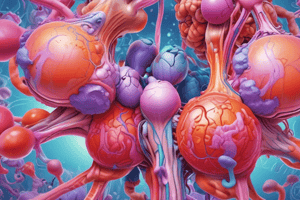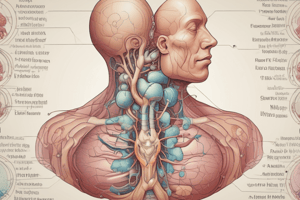Podcast
Questions and Answers
What is the primary function of the thyroid gland?
What is the primary function of the thyroid gland?
- Stimulate basal metabolic rate (correct)
- Help in the development of lymphocytes
- Regulate carbohydrate metabolism
- Increase blood calcium levels
Which hormone produced by the pancreas increases blood glucose levels?
Which hormone produced by the pancreas increases blood glucose levels?
- Glucagon (correct)
- Somatostatin
- Pancreatic polypeptide
- Insulin
Which hormone decreases blood calcium levels?
Which hormone decreases blood calcium levels?
- Thyrocalcitonin
- Vitamin D
- Parathormone
- Calcitonin (correct)
What is the shape of the thyroid gland?
What is the shape of the thyroid gland?
Which adrenal hormone is primarily responsible for regulating mineral salt metabolism?
Which adrenal hormone is primarily responsible for regulating mineral salt metabolism?
Where is the thymus located?
Where is the thymus located?
What is the function of somatostatin produced by the Islets of Langerhans?
What is the function of somatostatin produced by the Islets of Langerhans?
What is the approximate weight of the parathyroid glands?
What is the approximate weight of the parathyroid glands?
Which of the following is a function of adrenaline?
Which of the following is a function of adrenaline?
What is one role of dopamine in the human body?
What is one role of dopamine in the human body?
Which hormone is primarily involved in the maintenance of pregnancy?
Which hormone is primarily involved in the maintenance of pregnancy?
What is a primary function of estrogen during puberty?
What is a primary function of estrogen during puberty?
Where is the hormone prolactin primarily active?
Where is the hormone prolactin primarily active?
Which hormone is NOT produced in the gonads?
Which hormone is NOT produced in the gonads?
Which hormone is responsible for regulating the menstrual cycle?
Which hormone is responsible for regulating the menstrual cycle?
What is the primary action of relaxin during pregnancy?
What is the primary action of relaxin during pregnancy?
What is the primary function of Growth Hormone (GH)?
What is the primary function of Growth Hormone (GH)?
Which hormone is responsible for stimulating uterine contractions during childbirth?
Which hormone is responsible for stimulating uterine contractions during childbirth?
Which hormone regulates the secretion of adrenocorticotropic hormone (ACTH)?
Which hormone regulates the secretion of adrenocorticotropic hormone (ACTH)?
What effect does the hormone Somatostatin have on growth hormone secretion?
What effect does the hormone Somatostatin have on growth hormone secretion?
What is one of the main effects of Luteinizing Hormone (LH) in males?
What is one of the main effects of Luteinizing Hormone (LH) in males?
Which hormone controls the water absorption capacity of the renal tubule?
Which hormone controls the water absorption capacity of the renal tubule?
What hormone is secreted by the anterior pituitary and is essential for growth and development of the thyroid gland?
What hormone is secreted by the anterior pituitary and is essential for growth and development of the thyroid gland?
Which hormone primarily contributes to the growth of mammary glands and milk production?
Which hormone primarily contributes to the growth of mammary glands and milk production?
Flashcards
Thyroid
Thyroid
A butterfly-shaped gland in front of the trachea that regulates metabolism.
Triiodothyronine (T3)
Triiodothyronine (T3)
A hormone produced by the thyroid; it is four times more active than T4.
Thyroxine (T4)
Thyroxine (T4)
A thyroid hormone that helps regulate metabolism, less active than T3.
Parathyroid
Parathyroid
Signup and view all the flashcards
Calcitonin
Calcitonin
Signup and view all the flashcards
Thymus
Thymus
Signup and view all the flashcards
Islets of Langerhans
Islets of Langerhans
Signup and view all the flashcards
Glucagon
Glucagon
Signup and view all the flashcards
Insulin
Insulin
Signup and view all the flashcards
Adrenal glands
Adrenal glands
Signup and view all the flashcards
Cortex (of adrenal gland)
Cortex (of adrenal gland)
Signup and view all the flashcards
Glucocorticoids
Glucocorticoids
Signup and view all the flashcards
Mineralocorticoids
Mineralocorticoids
Signup and view all the flashcards
Testosterone
Testosterone
Signup and view all the flashcards
Estrogen
Estrogen
Signup and view all the flashcards
Progesterone
Progesterone
Signup and view all the flashcards
Human Chorionic Gonadotropin (hCG)
Human Chorionic Gonadotropin (hCG)
Signup and view all the flashcards
Pineal gland
Pineal gland
Signup and view all the flashcards
Norepinephrine
Norepinephrine
Signup and view all the flashcards
Dopamine
Dopamine
Signup and view all the flashcards
Relaxin
Relaxin
Signup and view all the flashcards
Prolactin
Prolactin
Signup and view all the flashcards
Proteinaceous hormones
Proteinaceous hormones
Signup and view all the flashcards
Steroidal hormones
Steroidal hormones
Signup and view all the flashcards
Study Notes
Thyroid
- Located on either side of the trachea, in front of the 2nd-4th tracheal rings.
- H-shaped and weighs approximately 25 grams (20-25 grams).
- Crucial for stimulating basal metabolic rate, protein synthesis, and increasing metabolic rate.
- Plays a role in glucose synthesis, lipolysis, and the development of the brain and gonads.
Triiodothyronine (T3) and Thyroxine (T4)
- T3 is approximately four times more active than T4.
Parathyroid
- Located on the dorsal part of the thyroid.
- Resembles a grain of rice and weighs approximately 30 milligrams.
- Plays a crucial role in increasing blood calcium levels by facilitating reabsorption in the intestines and kidneys.
- Lowers blood phosphate levels and activates vitamin D.
Calcitonin/Thyrocalcitonin/Parathormone
- Decreases blood calcium levels.
Thymus
- Located on each side of the trachea, just above the heart.
- Secretion is temporary and it is important for the formation of lymphocytes and antibodies.
- Plays a significant role in developing the immune response.
Islets of Langerhans
- Found within the pancreas (1-2%).
- a-cell: Produces Glucagon, which increases blood glucose by breaking down glycogen.
- B-cell: Produces Insulin, which reduces blood glucose by increasing glycogen synthesis.
- y-cell: Produces Pancreatic polypeptide.
- 8-cell: Produces Somatostatin, which reduces appetite.
Adrenal or Suprarenal
- Located above the kidney, covered by renal fascia or serosa fascia.
- Hat-like shaped and weighs around 7-10 grams.
Cortex (80%)
- Produces Glucocorticoid (Cortisol, Cortisone, Corticosterone), Mineralocorticoid (Aldosterone), and Gonadocorticoid (Estrogen, Androgen, Progesterone).
- Glucocorticoids: Regulate carbohydrate metabolism, stimulate glycogen synthesis in the liver and muscles, facilitate the absorption of sugar and lipids, prevent phagocytosis, chemotaxis, and allergy, and reduce antibody production.
- Mineralocorticoids: Regulate mineral salt metabolism, increase NaCl and water absorption, increase kidney capacity, increase plasma in blood, and increase K excretion rate.
- Gonadocorticoids: Regulate sexual differentiation of the embryo.
Pineal
- Located in the 3rd ventricle of the brain.
Testes
- Located in a sac outside the body cavity in the male body called the scrotum.
Ovary
- Located on the wall of the pelvic cavity in the female, on both sides of the uterus.
Placenta
- Plays a crucial role in pregnancy and childbirth.
Hormones
Adrenaline (Epinephrine) / Crisis/Emergency Hormone
- Releases glucose from glycogen stored in the liver and increases metabolic rate.
- Regulates body temperature.
- Controls involuntary muscle contraction of the heart and arteries.
- Increases heart rate.
- Plays a role in expressing fear, joy, and grief.
Nor-adrenaline (Norepinephrine)
- Stimulates heart muscle, increasing blood pressure.
- Converts excess glucose in the body into glycogen.
Dopamine
- Acts as a neurotransmitter.
- Accelerates phosphorus metabolism.
- Regulates sleep.
- Stimulates (activates) sexual organs.
- Regulates the biological clock.
Testosterone
- Enlarges male genital organs.
- Facilitates the expression of secondary sexual characteristics.
- Contributes to the continuation of sperm production.
- Stimulates the production of red blood corpuscles (RBC) in the red bone marrow.
Estrogen
- Helps in the expression of various sexual characteristics of the female during puberty.
- Regulates the menstrual cycle.
- Causes rapid RNA synthesis in the uterus tissue, controlling the growth of the uterus, fetus, and placenta during pregnancy in the female.
Progesterone
- Helps maintain pregnancy and normal growth of the mother's body and fetus during pregnancy.
Human Chorionic Gonadotropin (hCG)
- Plays a significant role in pregnancy.
Human Chorionic Somatomammotropin (hCS)
- Plays a significant role in pregnancy.
Relaxin
- Facilitates parturition (childbirth) at the end of pregnancy.
Prolactin
- Acts as a supplement to ovarian estrogen.
Progesterone
- Acts as a supplement to ovarian progesterone.
Placenta
- Plays a significant role in pregnancy by producing hormones.
Proteinaceous (Protein containing)
- A type of hormone.
Steroidal (Steroid containing)
- A type of hormone.
Pineal
- Located in the 3rd ventricle of the brain (Diencephalon).
Testes
- Located in a sac outside the body cavity in the male body called the scrotum.
Ovary
- Located on the wall of the pelvic cavity in the female, on both sides of the uterus.
Studying That Suits You
Use AI to generate personalized quizzes and flashcards to suit your learning preferences.




